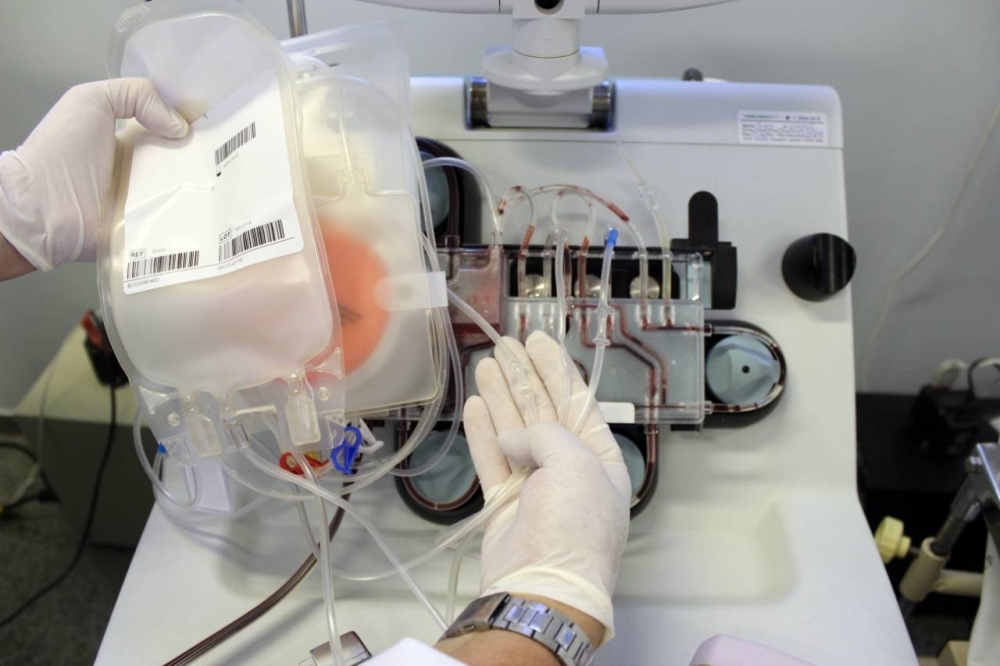

Scientists affiliated with the FAPESP-funded Center for Cell-Based Therapy have collected plasma from donors and are conducting a trial to check the safety and effectiveness of passive immunization (photo: CTC)
Scientists affiliated with the FAPESP-funded Center for Cell-Based Therapy have collected plasma from donors and are conducting a trial to check the safety and effectiveness of passive immunization.
Scientists affiliated with the FAPESP-funded Center for Cell-Based Therapy have collected plasma from donors and are conducting a trial to check the safety and effectiveness of passive immunization.

Scientists affiliated with the FAPESP-funded Center for Cell-Based Therapy have collected plasma from donors and are conducting a trial to check the safety and effectiveness of passive immunization (photo: CTC)
By Maria Fernanda Ziegler | Agência FAPESP – The transfusion of antibodies produced by people who have recovered from COVID-19 could be used to treat moderate and severe cases of the disease. To test the efficacy of this strategy, blood plasma containing antibodies against SARS-CoV-2 will be administered to 45 patients at the Ribeirão Preto Blood Center in the state of São Paulo, Brazil, attached to the hospital run in the city by the University of São Paulo (HC-FMRP-USP).
The technique is known as passive immunity transfer and is also being tested in other countries, including China, France, Italy and the United States.
“We don’t yet have licensed vaccines or drugs for COVID-19, so it’s important to test this strategy. We have to make sure antibody transfer is safe and helps neutralize the virus, contributing to recovery from the disease,” said Rodrigo Calado, principal investigator for the study and a senior researcher at the Center for Cell-Based Therapy (CTC), a Research, Innovation and Dissemination Center (RIDC) funded by FAPESP and hosted by HC-FMRP-USP.
Infection by a virus like SARS-CoV-2 activates the patient’s immune system, which produces antibodies (proteins secreted by white blood cells called lymphocytes) to attack the pathogen.
“Depending on each individual’s immune response, it can take between seven and 20 days to produce enough antibodies to eliminate the virus,” Calado said.
The underway study at the Ribeirão Preto Blood Center will take this timing into account, transfusing plasma with antibodies not later than the sixth day after infection if there are signs that the patient’s condition is set to worsen.
“The disease has two stages, viral replication and severe inflammation. Plasma transfusion must be performed before the inflammation gets too severe so that the donated antibodies can act directly on the virus,” Calado said.
The project has been approved by CONEP, Brazil’s National Research Ethics Committee, which regulates clinical trials, and Calado and his group are now collecting plasma from donors who have recovered from COVID-19. Similar research initiatives are under way at the University of Campinas (UNICAMP), the University of São Paulo’s Medical School in São Paulo City, and Albert Einstein Hospital and Sírio-Libanês Hospital in the same city.
“We should join forces at a time like this,” Calado said. “We’re talking to other research centers. We have experience in running clinical trials and can help colleagues with this knowledge. It’s also a good idea to increase the number of patients tested in order to obtain a more robust assessment of the safety and effectiveness of this strategy for cases of COVID-19.”
Tried and tested
Passive immunization is not new to science but a tried and tested technique. It was developed in the 1890s and first used to treat diphtheria, a disease that killed thousands at the time and for which there was no vaccine. Emil von Behring (1854-1917) won the 1901 Nobel Prize in Medicine for his discovery of the technique. More recently, it was used during the 2002 SARS epidemic and in cases of shingles.
The most common application in Brazil is in anti-venom, in which antibodies produced by horses, sheep and other animals exposed to snake, scorpion or spider venom are transferred to patients who have been bitten or stung. They neutralize the venom and not a virus, as in the experiment with passive immunization to treat COVID-19.
“The advantage is that the technique can be tested, especially in an emergency,” Calado said. “Ideally we’d have a vaccine based on the attenuated virus, so that people who have never had the disease actively produce their own antibodies, but developing a vaccine will take time for research and trials. Right now in the middle of the pandemic it’s quicker to test the plasma method. It also takes a long time for pharmaceutical companies to develop drugs. If the technique is proved effective and safe, we can simply collect plasma from donors and transfuse it.”
Although the technique has been used to treat other diseases, Calado added, it is necessary to make sure plasma transfer reduces mortality from COVID-19 and can be used safely to treat the disease. “Transfusion involves 600 milliliters of plasma, an amount that can overburden the lungs and heart,” he said. “Another risk is triggering an exacerbated inflammatory reaction instead of reducing it. It could cause allergy or other reactions. We have to test it first to make sure it’s safe and can be beneficial.”
Republish
The Agency FAPESP licenses news via Creative Commons (CC-BY-NC-ND) so that they can be republished free of charge and in a simple way by other digital or printed vehicles. Agência FAPESP must be credited as the source of the content being republished and the name of the reporter (if any) must be attributed. Using the HMTL button below allows compliance with these rules, detailed in Digital Republishing Policy FAPESP.





